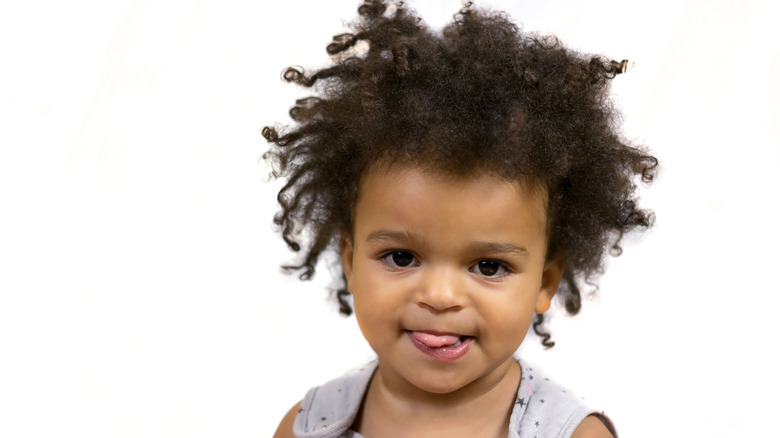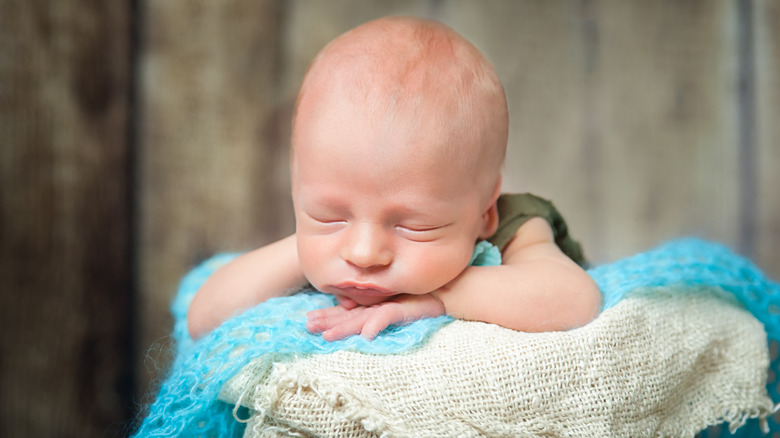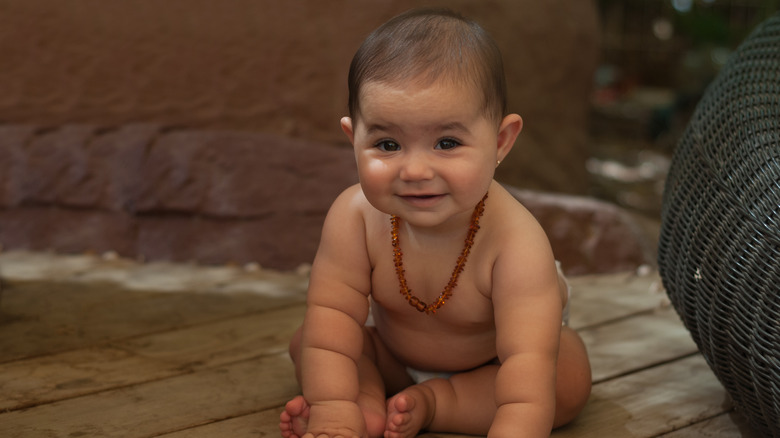Stunning French Baby Names You've Never Heard Of
The world is in love with all things French, from the food to the cuisine and especially to the language. What is it about French that makes it so elegant and refined? It belongs to a category of languages known as the Romance languages, and is widely considered to be the language of love. Whether or not you have French ancestry yourself, you can capture a little piece of the country's sophistication by gifting your little one with a French name.
While people outside of France are familiar with some French names such as Belle and Gaston (thanks, Beauty and the Beast) many of the language's most beautiful names are virtually unknown to native English speakers. From variations of common English names to monikers that are uniquely French, you've probably never heard of these stunning French names — but they should be at the top of every Francophile's baby name list.
Amandine
The French diminutive of Amanda, Amandine is a beautiful alternative to its sometimes-overused source. The name Amanda is used all over Europe and has even popped up in Chile. From the 1970s to the 1990s, it was so popular in the United States that it even briefly saw use as a boys name, hitting a peak rank of 735 on the list of top-ranked baby boy names. Amanda's popularity has taken a nosedive since the mid-2000's, though. It fell out of the top 100 names for girls in 2006 and has become more unpopular every year since then.
While this is bad news for Amanda, it does leave the perfect opening for Amandine to come onto the scene and shake things up. The name even has literary roots (via a slight spelling variation). The iconic French novelist who wrote under the nom de plume George Sand was born Amantine-Lucile-Aurore Dupin.
Alain
If you're tired of the name Alan, we really can't blame you. This name dates back to at least the 6th century. While it does have French roots (the name traces back to the French region of Brittany), we prefer a different French version: Alain, which was a widely used name in France for much of the 20th century, but fell out of favor in the new millennium. It even narrowly made the cutoff of ranked baby names in the United States in 1985 (coming in at 998) although it hadn't been seen on the top baby names lists before then, and hasn't returned since.
Alain could be a total gamechanger for American parents who have kept Alan in wide circulation for more than one hundred years. Alan has also seen widespread use in England, Wales, the Netherlands, Catalonia, and even Poland, so the world is more than ready for a fresh take on the moniker.
Coline
While it might look like a variation of the Irish name Colleen, Coline actually has a completely different origin. Colleen comes from the Irish word "cailin" which means "girl," while Coline is a diminutive of another French name, Nicole, and its use as a given name is fairly recent. Coline first popped up on in the scene in the 1980s and since then has been a mainstay on the baby name charts. While it's out of the top hundred girls names (for now), it's still fairly popular and is ready to be adored by a new generation of American babies.
Nicole is the French baby name that just keeps on giving. Aside from Coline, there are two other lovely variations of the moniker, both of which have seen traction in the U.S. There's Nicolette and also its diminutive Colette, which has recently been back on the rise for American babies after falling off baby name charts in the late 20th century.
Elouan
Thought to come from a Breton word meaning "light," Elouan is an elegant name with a distinctly French sound. Oregon winemaker Joseph Wagner borrowed the name for his pinot noir, so while your little boy might have trouble finding his name on a key chain, at least he'll be able to find it on a bottle of wine — once he's old enough to drink, of course.
Even in France, this name is a little underrated and isn't too commonly used. Far more popular is the shortened version of the name, Loan, which has also sometimes been used as a feminine name. If the fact that it is spelled the same as the English word "loan" is a little too off-putting for you, you could opt for the alternative spelling of Loann. No matter which variation of this moniker you pick, the new light of your life will go through the world with a dignified name.
Élie
Elijah is one of the hottest names for American boys right now, and is also on the rise in other English-speaking countries as well as France and the Netherlands. With so many babies bearing the name, it's understandable to want to seek an alternative. Enter Élie, the French version of the name which is ultimately derived from the Hebrew Eliyyahu which means "my God is Yahweh." While it has religious roots, variations of this name are popular with religious and non-religious parents alike.
If the accent mark adds a little too much to the name for your tastes, you can opt to leave it off. Even most French parents are opting to spell the moniker as Elie. It's also a good substitute for another trending baby names for American boys: Eli and Elias. Your little Élie will be in good company, as he'll share a name with Nobel-prize winning author Elie Wiesel.
Gabin
While the name Gavin has slightly dropped off in popularity in the last few years, it has been a top 100 name for American baby boys since the turn of the millennium. It's a timeless classic that has its roots in medieval times. In an earlier form, Gawain is best remembered as the name of the legendary King Arthur's nephew and one of his Knights of the Round Table.
The French name Gabin isn't actually related to Gavin, but it is just one letter off making it a good alternative to the more common moniker. It is the French version of the Italian name Gavino, which was the name of a 3rd century saint, giving Gabin ancient roots just like Gavin. It has recently been on the rise in France, so you'd still be giving your baby a popular name, just one that is popular in Europe instead of America.
Karine
Somehow, the French have a way of making everything seem more sophisticated. Take a standard name like Karen, for example. While lovely, this Danish shortened form of Katherine has become so popular in English-speaking countries that it feels like it has always been an English name. It is so widely used that at the peak of its popularity in the mid-20th century, many American parents were even giving the name to their baby boys.
Karen might be overused, but the French name Karine, on the other hand, has a similar sound and spelling yet still manages to sound new and elegant (at least to American ears). It is both the French version of the name Carina and the French version of the name Karin, which is the Swedish nickname for Catherine. If "k" names aren't your style, the French still have you covered; the name can also be spelled as Carine.
Marcelin
You've probably heard of the French name Marcel which has been a popular name for years in several European countries. Even in the United States, the name has been slowly on the rise. Marcelin shares the same root, but unlike Marcel it is used primarily in France. The extra syllable tacked onto the end gives it a little flourish, making this a slightly fancier version of the name. If it's a little too long for your baby boy, you can still dress it down and use Marcel as a built-in nickname. If you want to go in the other direction and make the name even more elaborate, you can opt for an extra "l" and spell the name as Marcellin.
The name Marcelin can also be used as an alternative for Marcus. Both Marcel and Marcelin can trace their origins back to this ancient Roman name which also gave us the longstanding name Mark.
Ambre
Goodbye Amber, hello Ambre! The American version of this name was one of the most popular for American baby girls born in the 1980s and 1990s, and still sees a fair amount of use every year. Amber has also made baby name charts in several other English-speaking countries, as well as Belgium and the Netherlands. The name's long decades of popularity mean that even people who love this classic are itching for a change, and Ambre is ready to step up to the bat.
Switching those two letters makes a world of difference, and breathes new life into this sparkling name. Ambre is a hit with French babies, and has steadily been climbing up the name charts with a 2016 ranking of 19. It hasn't caught on in the U.S. yet, but as its popularity grows in France, it's likely that American parents will soon join in on the trend.
Noé
Spelled with or without the accent mark, Noé is a baby name on the rise. While it is also a Spanish and Portuguese name, Noé is most popular in France where both Noé and Noe consistently make charts of top baby names. In 2011, Noé took over as the preferred name spelling, but Noe wins out in the United States where the name is used enough to be ranked (it was the 659th most popular male baby name of 2017) but not popular enough to be mainstream.
It's only a matter of time before forward-thinking parents turn to this French name as an alternative to the wildly popular Noah, which is trending everywhere from the U.S. to Europe, Australia, and New Zealand. Noah is one of the most popular names in the world, but Noé has more versatility. While it's traditionally used as a masculine name, in the Netherlands Noé is emerging as a baby name for girls.










